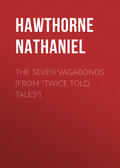
Натаниель Готорн
Fire Worship (From "Mosses from an Old Manse")
These barren and tedious eccentricities are all that the air-tight stove can bestow in exchange for the invaluable moral influences which we have lost by our desertion of the open fireplace. Alas! is this world so very bright that we can afford to choke up such a domestic fountain of gladsomeness, and sit down by its darkened source without being conscious of a gloom?
It is my belief that social intercourse cannot long continue what it has been, now that we have subtracted from it so important and vivifying an element as firelight. The effects will be more perceptible on our children and the generations that shall succeed them than on ourselves, the mechanism of whose life may remain unchanged, though its spirit be far other than it was. The sacred trust of the household fire has been transmitted in unbroken succession from the earliest ages, and faithfully cherished in spite of every discouragement such as the curfew law of the Norman conquerors, until in these evil days physical science has nearly succeeded in extinguishing it. But we at least have our youthful recollections tinged with the glow of the hearth, and our life-long habits and associations arranged on the principle of a mutual bond in the domestic fire. Therefore, though the sociable friend be forever departed, yet in a degree he will be spiritually present with us; and still more will the empty forms which were once full of his rejoicing presence continue to rule our manners. We shall draw our chairs together as we and our forefathers have been wont for thousands of years back, and sit around some blank and empty corner of the room, babbling with unreal cheerfulness of topics suitable to the homely fireside. A warmth from the past – from the ashes of bygone years and the raked-up embers of long ago – will sometimes thaw the ice about our hearts; but it must be otherwise with our successors. On the most favorable supposition, they will be acquainted with the fireside in no better shape than that of the sullen stove; and more probably they will have grown up amid furnace heat in houses which might be fancied to have their foundation over the infernal pit, whence sulphurous steams and unbreathable exhalations ascend through the apertures of the floor. There will be nothing to attract these poor children to one centre. They will never behold one another through that peculiar medium of vision the ruddy gleam of blazing wood or bituminous coal – which gives the human spirit so deep an insight into its fellows and melts all humanity into one cordial heart of hearts. Domestic life, if it may still be termed domestic, will seek its separate corners, and never gather itself into groups. The easy gossip; the merry yet unambitious Jest; the life-like, practical discussion of real matters in a casual way; the soul of truth which is so often incarnated in a simple fireside word, – will disappear from earth. Conversation will contract the air of debate, and all mortal intercourse be chilled with a fatal frost.
In classic times, the exhortation to fight "pro axis et focis," for the altars and the hearths, was considered the strongest appeal that could be made to patriotism. And it seemed an immortal utterance; for all subsequent ages and people have acknowledged its force and responded to it with the full portion of manhood that nature had assigned to each. Wisely were the altar and the hearth conjoined in one mighty sentence; for the hearth, too, had its kindred sanctity. Religion sat down beside it, not in the priestly robes which decorated and perhaps disguised her at the altar, but arrayed in a simple matron's garb, and uttering her lessons with the tenderness of a mother's voice and heart. The holy hearth! If any earthly and material thing, or rather a divine idea embodied in brick and mortar, might be supposed to possess the permanence of moral truth, it was this. All revered it. The man who did not put off his shoes upon this holy ground would have deemed it pastime to trample upon the altar. It has been our task to uproot the hearth. What further reform is left for our children to achieve, unless they overthrow the altar too? And by what appeal hereafter, when the breath of hostile armies may mingle with the pure, cold breezes of our country, shall we attempt to rouse up native valor? Fight for your hearths? There will be none throughout the land.







